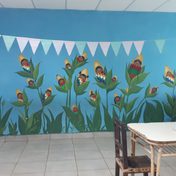Teaching Tools is dedicated to the intersections between pedagogy, ethnography, and anthropology. The section is a growing resource for instructors, teaching assistants, and students, with everything from discussion guides and in-class activities to critically minded reflections on the practice, politics, and poetics of teaching anthropology, whether inside the academy or in alternative settings.

Part 2 (Epilogue): Teaching Orientalism in a Time of Genocide and Rising Fascism
This post is part of a two-post series on teaching with the work of Edward Said. Read part one here. They are there all right, but the narrative of their presen... More

Part 1: Teaching Orientalism at the Intersection of History and Anthropology
This post is part of a two-post series on teaching with the work of Edward Said. Read the epilogue here. Edward Said’s Orientalism (1978) has profoundly affecte... More

Teaching and Organizing for Environmental Justice in Baltimore
Baltimore’s residents of color are twice as likely as white residents to develop cancer from toxic exposure, and suffer some of the highest asthma hospitalizati... More

On Teaching Race and Racism at Princeton
BeginningsTeaching race and racism at Princeton University brought home to me the truism that the U.S. conversation about race and racism is, if anything, diffe... More

In the Name of Interculturality
We were walking with Juana, an Avá Guaraní teacher from the province of Salta (Argentina), through the school’s courtyard and into the library. Inside was the s... More

Multimodal Craft, Epistemological Stakes, and Transduction Pedagogy
Many of us are producing and teaching ethnographic work that is nonlinear, multimodal, multisensorial, and/or born digital. Students are energized when they enc... More

Anthropological Sketchnoting: In the Classroom
In the previous post of this dual series on turning to sketchnoting as an anthropologist, I focused on incorporating visual thinking and drawing in ethnographic... More

When Words Are Not Enough: Teaching Anthropology with Zines and Scrapbooks
“I learned that you had spent a lifetime equally devoted to the conviction that words are not good enough. Not only not good enough, but corrosive to all that i... More

The Case for Paying it Backward: Thanking the Teachers Who Leave Imprints
When I wrote an email thanking my mentor for her guidance as I applied to graduate school, she replied with a note of acknowledgement, but ended with the reques... More

Teaching Ecological Distress
This collection is compiled by the Ecological Distress Collective, hosted at SOAS Anthropology. Introduction In recent years, the medical and psychological scie... More